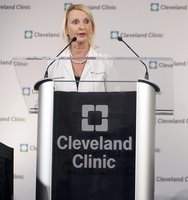Cleveland Clinic lecture to update cervical cancer prevention options

Palm Beach, CA
Starting in the mid-1950s, the pap test has decreased cervical cancer rates by more than 70 percent in the United States.
Still, nearly 11,000 American women are diagnosed with the disease each year, and about 3,700 will die from it in 2009, according to the National Cancer Institute.
The death rate, however, will likely continue to fall because of the second major breakthrough in cervical cancer prevention, a vaccine approved by the FDA in mid-2006 to block the two strains of human papillomavirus responsible for 70 percent of all cervical cancers.
Dr. Claudia Mason will discuss cervical cancer screening as part of her March 24 lecture, "What's New in Gynecological Health." That lecture starts at 6 p.m. at Cleveland Clinic Florida Health and Wellness Center in West Palm Beach.
"All women should be screened for cervical cancer starting within three years of the onset of intercourse, and by age 21, certainly," said Mason, a gynecologist who specializes in menopausal medicine, obstetrics and minimally invasive surgery. "After age 30, we can screen on a less-frequent basis for women at low risk."
That category includes women who have tested negative for HPV and have had three normal pap smears in a row, she said.
The HPV vaccine, marketed as Gardasil, prevents infections from four subtypes of the common, sexually transmitted HPV, two that cause genital warts and two that cause cervical cancer.
"But there are other subtypes that cause cervical cancer, so screening is still necessary," Mason said.
In 2007, after some states began making HPV vaccinations mandatory for preteen girls in public schools — typically with a parental opt-out clause — some groups objected. Some conservative organizations said mandating the vaccine condones sexual activity and lessens parents' control over their children.
Medical professionals, however, urge vaccination before puberty.
"It makes sense to vaccinate prior to sexual activity," Mason said. "This is a huge breakthrough. Understanding that there is prevention for a vast majority of cervical cancer, what parent wouldn't want to vaccinate their child against cancer?"
Gardasil is recommended for females 9 to 26 years old and offers effective protection against cancer-causing HPV strains 16 and 18 for five years.
Another HPV vaccine, Cervarix, could earn FDA approval as early as year's end. Preliminary trials have shown Cervarix offers more than six years of protection against the two HPV strains that cause most cervical cancers. However, it does not protect against genital warts.
Mason also will discuss hormone-replacement therapy options for menopausal women.
There is no admission charge for her lecture or for a lecture at 6 p.m. today by Dr. Lester Rosen on "Screening for Colon and Rectal Cancer."
Those talks and one on April 14 by Dr. Martin Newman — "Ten Dos and Don'ts of Cosmetic Surgery" — are free and open to the public.
All will take place at Cleveland Clinic's West Palm Beach facility, 525 Okeechobee Blvd.
For reservations or more information, call (800) 691-6555.
Labels: Cervical Cancer Awareness, Cervical Cancer Prevention, Cervical Cancer Research

0 Comments:
Post a Comment
<< Home